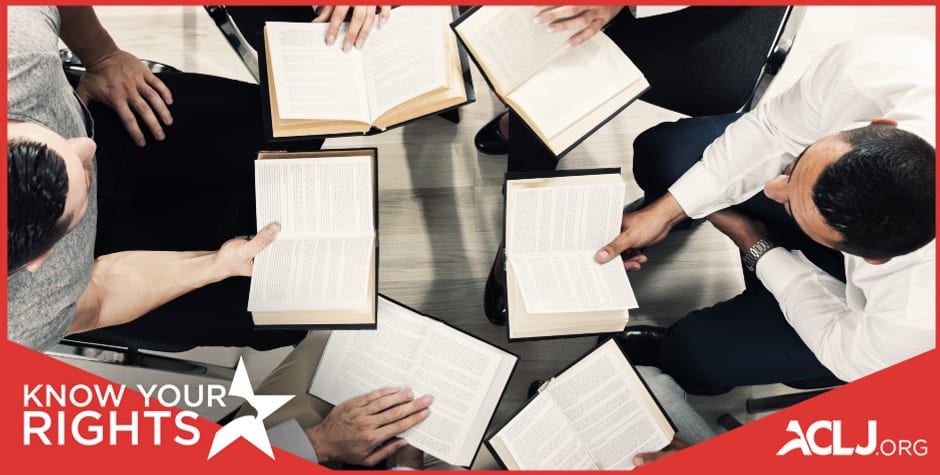Know Your Rights: Bibles and Voluntary Bible Studies in the Workplace
We often receive questions relating to an employee’s right to keep a Bible on his/her desk or to read or host a voluntary Bible study during one’s lunch break. Unfortunately – and contrary to First Amendment principles and federal law – some employers mistakenly instruct employees not to engage in such activity while at work. This erroneous instruction is many times driven by a complaint from a co-worker who is offended or bothered by the expression.
The legal considerations differ depending on whether you work for a government (public) entity or a private one. For example, if you are employed by a private entity, federal law – specifically Title VII of the Civil Rights Act of 1964 – applies and prohibits discrimination against religious speech and expression at work. Title VII also requires employers to reasonably accommodate the religious observances and practices of employees unless doing so would impose an undue hardship on the conduct of the employer’s business. Id. Accordingly, if your employer allows employees to have personal items on their desks or in their workspaces, your employer should permit you to do the same – regardless of whether those items are religious in nature. Similarly, if your employer allows employees to engage in personal activities during break or lunchtime (i.e., personal conversations, phone calls, free time), your employer should not attempt to interfere with your use of that same time to read your Bible or host a voluntary Bible study). Such expression should not be restricted so long as it does not cause disruption or interrupt the workplace.
If you are employed by a governmental entity, the First Amendment (in addition to Title VII) applies to prohibit the suppression of private speech and expression in the workplace. As we explain in more detail in our white paper, a common misconception is that the Establishment Clause of the First Amendment imposes some affirmative duty on the government to suppress private religious expression. However, the Supreme Court has rejected the notion that public employees may “constitutionally be compelled to relinquish the First Amendment rights they would otherwise enjoy as citizens to comment on matters of public interest.” In sum, “there is a crucial difference between government speech endorsing religion, which the Establishment Clause forbids, and private speech endorsing religion, which the Free Speech and Free Exercise Clauses protect.”
Generally speaking, if your speech does not take place within the scope of your official duties, your speech is private. While not binding on state governments, guidelines published by the federal government provide helpful instruction on the issue:
Employees should be permitted to engage in religious expression with fellow employees, to the same extent that they may engage in comparable nonreligious private expression, subject to reasonable and content-neutral standards and restrictions: such expression should not be restricted so long as it does not interfere with workplace efficiency.
The guidelines also provide that if “during lunch, certain employees gather on their own time for prayer and Bible study in an empty conference room that employees are generally free to use on a first-come, first-served basis[,] [s]uch a gathering may not be subject to discriminatory restrictions because of its religious content.”Moreover, “[s]uch a gathering does not constitute religious harassment even if other employees with different views on how to pray might feel excluded or ask that the group be disbanded.” In other words, “a hostile environment is not created by the bare expression of speech with which some employees might disagree.”
If you have been instructed by your employer not to engage in religious expression while at your workplace, and you have questions regarding your rights, please contact the ACLJ for more information.
We are dedicated to defending your constitutional rights. We have been providing assistance and legal representation, at no cost or charge, to people just like you for decades. If your rights are being violated in this area, please contact us at ACLJ.org/HELP.
